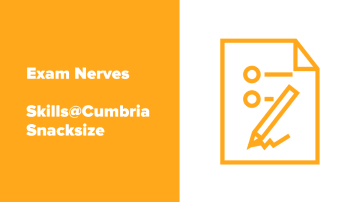Analysis of a case study - A case study will be related to the content of your module and your learning objectives. You should take the knowledge that you have gained over the course and apply it to the given situation. You will gain marks for applying relevant materials, theories or legislation where necessary.
Multiple choice exam - These questions offer you a list of possible answers, some may be very similar. Read the possible answers closely to ensure you know what each indicates before making your selection. You are being tested to make judgements under pressure. Take your time, don’t rush, and allow time to review your answers at the end of the exam.
Open book exam – An open book exam is a time constrained unseen exam where students can bring in books or folders. In this type of exam, you are asked to apply and critique the information you have learned. As you have access to sources you aren’t being checked on your memory of facts. Make sure you have organised all of your materials before the start of your test to make best use of your time.
Seen Exam – A seen exam is a time-constrained assessment task, presented to students at some time in advance of the assessment. The actual exam is still taken under strict conditions, with no external material allowed into the exam room and a time limit for completing the answers.
Short answer exam - You are being invited to demonstrate your knowledge of a topic in a very concise and direct way. Consider noting down the answer in bullet points first and review to form full sentences. Be selective in your answer to include the most important information.
Spoken exam - Be prepared to speak aloud about yourself and your work. Make sure you have a good understanding of the topic you need to speak about and you cover all aspects of the question and learning objectives. Consider writing your talk into bullet points and practise the talk through a number of times, checking for content and running to time. Expect to respond to questions from your examiner. You may want to practise this by considering what types of question you might be asked and recording your answers to them. Listen back to your recording and analyse your answers, making sure you keep to your allotted time. Preparing some phrases that indicate whether you agree or disagree with a point of view presented by your examiner might help give you a bit of breathing space to think about your fuller answer
Unseen Exam - An unseen exam is a time-constrained assessment task, presented to students for the first time at the beginning of the assessment. Unseen exams are usually hand-written and last two to three hours. They are sometimes required by professional bodies.




 You may find that using a mobile phone blocker such as
You may find that using a mobile phone blocker such as